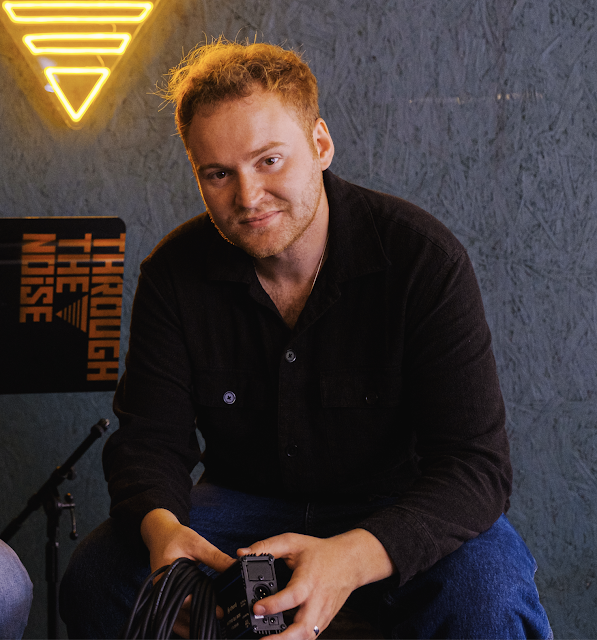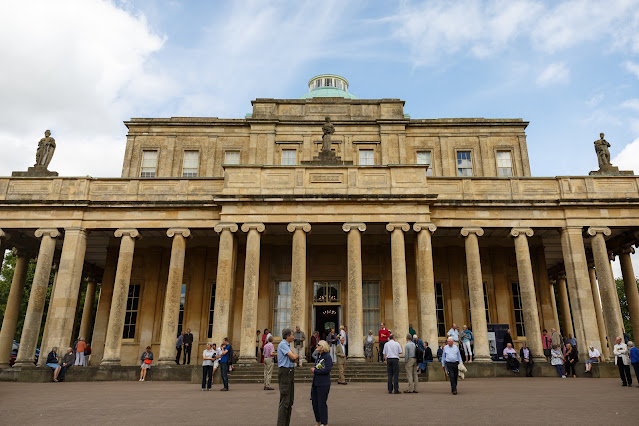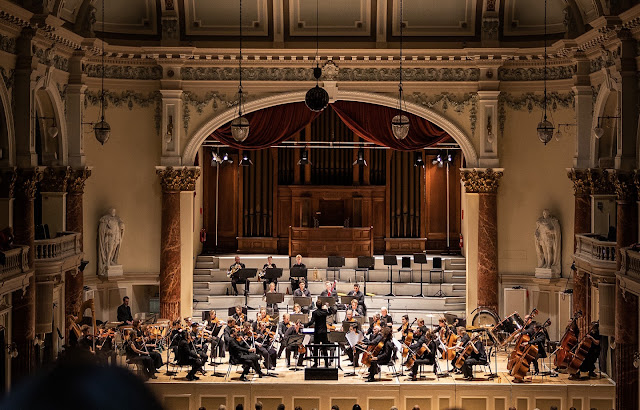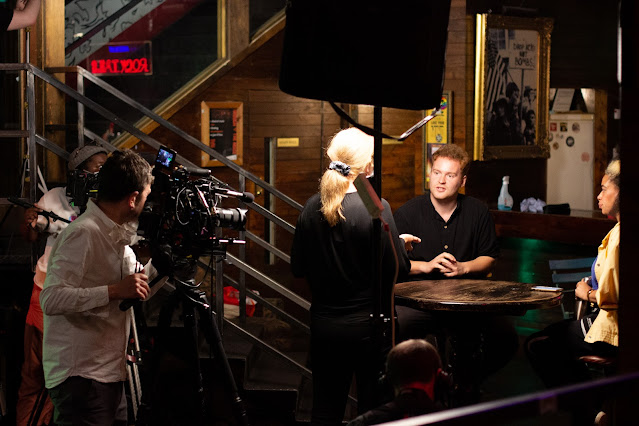 |
| Jack Bazalgette (Photo: Ehimetalor Unuabona) |
Jack Bazalgette is perhaps best known as the co-founder and director of through the noise, which since 2020 has programmed more than 130 classical music concerts in non-traditional venues using an innovative crowd-funding model to widen audience appeal [see my review of their noisenight at the 2024 Leeds Lieder Festival].
Last year, Jack was appointed as artistic director of the Cheltenham Music Festival and the 2025 festival, which runs from 4 to 12 July, is the first under his stewardship. This year, not only is the festival celebrating its 80th birthday, but also the 150th birthday of local son, Gustav Holst.
When I ask Jack what, for him are the highlights of this year’s festival he charmingly demurs but highlights the festival’s final concert on 12 July when the BBC National Orchestra of Wales (BBC NOW), conductor Gergely Madaras is playing a programme which reflects the festival’s early years. For Jack this is important, he points out that so many great pieces were commissioned by or written for the festival and he was keen to highlight these. The 12 July concert will feature Malcolm Arnold’s Symphony No. 5 which premiered at Cheltenham in 1961 and which Jack sees is a masterpiece that he seeks to reclaim for the festival. The whole programme has these sorts of links, there is Britten’s Four Sea Interludes from Peter Grimes, which rather amazingly premiered at the first festival in 1945, a new piece by Anna Semple which has been commissioned specially, and Elgar’s Enigma Variations which were in that first ever concert.
The first concert of the festival in 1945 featured the Elgar alongside new works, and this is a mix that Jack wants to get back to, a mix that he hopes will bring audiences to new music. He admits that orchestral programming is always tricky; additionally, in Cheltenham, they have to be mindful of what will actually fit on the stage. Also, being a festival rather than a concert series, they only get one chance at getting something right. He points out that with the 12 July concert having both the Britten and the Elgar, each work is made up of multiple smaller movements, which brings coherence to the overall programme too. You also need to bear in mind that Cheltenham is a spa town, a fun place and he wants the festival concerts to bring a fun day out as well as broaden the mind.
 |
| The Pump Room, Cheltenham – built by architect John Forbes between 1825 and 1830 |
This year’s festival programme is virtually all Jack’s responsibility; when he took over the fixed points were a concert from the BBC NOW and Madaras (with an unspecified programme) and the idea of doing Friday Night is Music Night in Cheltenham (on 11 July with vocalist Clare Teal, BBC Concert Orchestra and conductor Karen Ni Bhroin), and he admits that the programme was pulled together quite quickly but this isn’t the first time this has happened at the festival, other years there have been quick changes between artistic director. But as he gets into the festival he wants to plan further in advance as it is difficult getting bigger artists at short notice, though it should be pointed out that this year’s festival includes performances from pianists Imogen Cooper and Pavel Kolesnikov and mezzo-soprano Sarah Connolly.
The UK is blessed with lots of festivals, these come in all shapes and sizes and are usually differentiated by place. At Cheltenham, Jack feels they are blessed with two amazing venues, the Pump Room and the Town Hall, but he wants to go further than this and re-establish the festival as a home for new music and music creation. The festival has always been a home for composers, from Vaughan Williams, Britten and Malcolm Arnold in the early days to Thomas Adès bringing his students in the 1990s. In the festival’s 80 years, there have been over 1000 premieres, and Jack wants to recapture some of this identity by supporting contemporary composers. But he admits that the hard thing in the present climate is to fund a commission, particularly as you usually don’t get the money back in ticket sales. But as the festival’s finances improve, as they are doing as he proudly points out, so they will be able to expand the new music strand. [after Jack and I had talked, the festival announced that it had secured funding for its highly regarded Composer Academy which returns this year under composer & alumnus Daniel Kidane. See my article.]
Even when he co-founded through the noise, Jack emphasises that he was never an on-stage creative, yet he is always a presence, guiding, suggesting and questioning, the intention being to guide the performers through putting on a great concert. He admits that he is always learning, with some performers he says nothing but others need more guidance and support. He finds it stimulating and challenging, not treading on toes and trying to give people the space to make their best work. There have been times when he has tried to help but the final product was not ideal, and he always tries to learn from his mistakes.
The team at through the noise has recently expanded to Jack will continue as director there as well as being artistic director at Cheltenham, pointing out that traditionally the festival has never been run by a full-time person.
 |
| City of Birmingham Symphony Orchestra at Cheltenham Town Hall – Cheltenham Music Festival 2023 |
He is proud of the overarching feel of the festival and the overall balance of different strands, and he worries that he might go too far down a particular rabbit hole. This year, he feels, there is a balance between high-level music performance, new and interesting programmes, and left-field events, as well as four different orchestras doing four different programmes:
- Berlioz’ Te Deum in Gloucester Cathedral conducted by Adrian Partington
- Mozart’s Requiem in the Town Hall with David Crown conducting Cheltenham Bach Choir and the Musical and Amicable Society
- Friday Night is Music Night with BBC Concert Orchestra
- BBC National Orchestra of Wales in Britten, Arnold, Anna Semple and Elgar
There are also two significant commissions, Deborah Pritchard‘s Octet which the Britten Sinfonia are playing with Mendelssohn’s Octet at the opening concert, and Anna Semple’s work for the closing concert. This is impressive in the current climate, as the festival has no funding partners for these commissions.
He sees this year’s festival as a good step in the longer-term plan towards where he would like to be in five years. He wants the festival to thrive and grow, not just in size but in confidence, so that they can take artistic risks whilst taking the audience with them, to create the UK’s home of composing and commissioning.
At the same time, he wants to demonstrate how broad a classical festival can be, and he feels that the best way to do this is to have as broad a church as possible, so it is not either or. This year, there is Kora player Seckou Keita, not instead of classical repertoire but as well as. He wants to show that the festival is open-minded, open to all and can include events like this which can be a way in for people. He points out that through the noise presents jazz events, but their core is still classical music. He wants to get over the feeling that as soon as a festival includes non-classical music then it is no longer serious.
He feels that it will take five years before the festival returns to the significance and scale that it had before COVID. They need big audiences and big ticket sales to be able to succeed, and this year’s ticket sales are up drastically. To afford big names, they need people to come to the festival and this takes years, but this year is a big step in the right direction.
 |
| Jack Bazalgette being filmed for BBC Proms |
The festival is lucky to have a large community of established audience members, many live within a 20-minute drive of Cheltenham and have been coming for decades, they care deeply about the festival and provide deep roots of support. He hopes to grow the number of visitors to the festival. Cheltenham is a bit of a holiday city, a great place to spend a few days. The intention is to attract cultural holidaymakers. But to get them they need to justify the visit, to have enough events that are a draw, and enough concerts to make a trip worthwhile. The festival will be doing surveys this year, to find out more.
Jack’s final point is that the music festival can also take advantage of being part of a family. The other Cheltenham festivals are massive – the jazz, science, and literature festivals are a big part of the cultural life of the city.
The blog is free, but I’d be delighted if you were to show your appreciation by buying me a coffee.
Elsewhere on this blog
- From RVW’s Sancta Civitas & Bliss’ The Beatitudes to Reich’s The Desert Music & Birtwistle’s Earth Dances, plus 19 premieres: the BBC Proms 2025
- Fierce virtuosity & sheer delight: oboist Olivier Stankiewicz, soprano Lucy Crowe, violinist Maria Włoszczowska & friends in a captivating evening of Bach, Zelenka, Handel, Vivaldi – concert review
- Dramatic engagement: Francesco Corti directs Bach’s St John Passion with the English Concert at Wigmore Hall on Good Friday – concert review
- Searching for possibilities: composer Noah Max on his four string quartets recently recorded by the Tippett Quartet on Toccata Classics – interview
- Youthful impulse and power: Mozart’s Requiem from National Youth Choir, Sinfonia Smith Square and Nicholas Chalmers – concert review
- Looking at these modern classics anew: Britten’s Canticles at the Barbican with James Way, Natalie Burch & friends – concert review
- This production, will undoubtedly be remembered for years to come: Massenet’s Werther in Paris with Marina Viotti, Benjamin Bernheim & Marc Leroy-Calatayud conducting Les Siècles – opera review
- Compelling & magisterial: Sunwook Kim directs Chamber Orchestra of Europe from the piano in Beethoven’s 3rd & 4th piano concertos – review
- Letter from Florida: Mozart, Verdi, Rossini, Leoncavallo & Mascagni at Sarasota Opera’s Winter Festival – opera review
- An incredible feeling when you get it right; Martin Owen on performing Mozart’s complete horn concertos with Manchester Camerata – interview
- Home




.jpg?w=670&resize=670,446&ssl=1)




